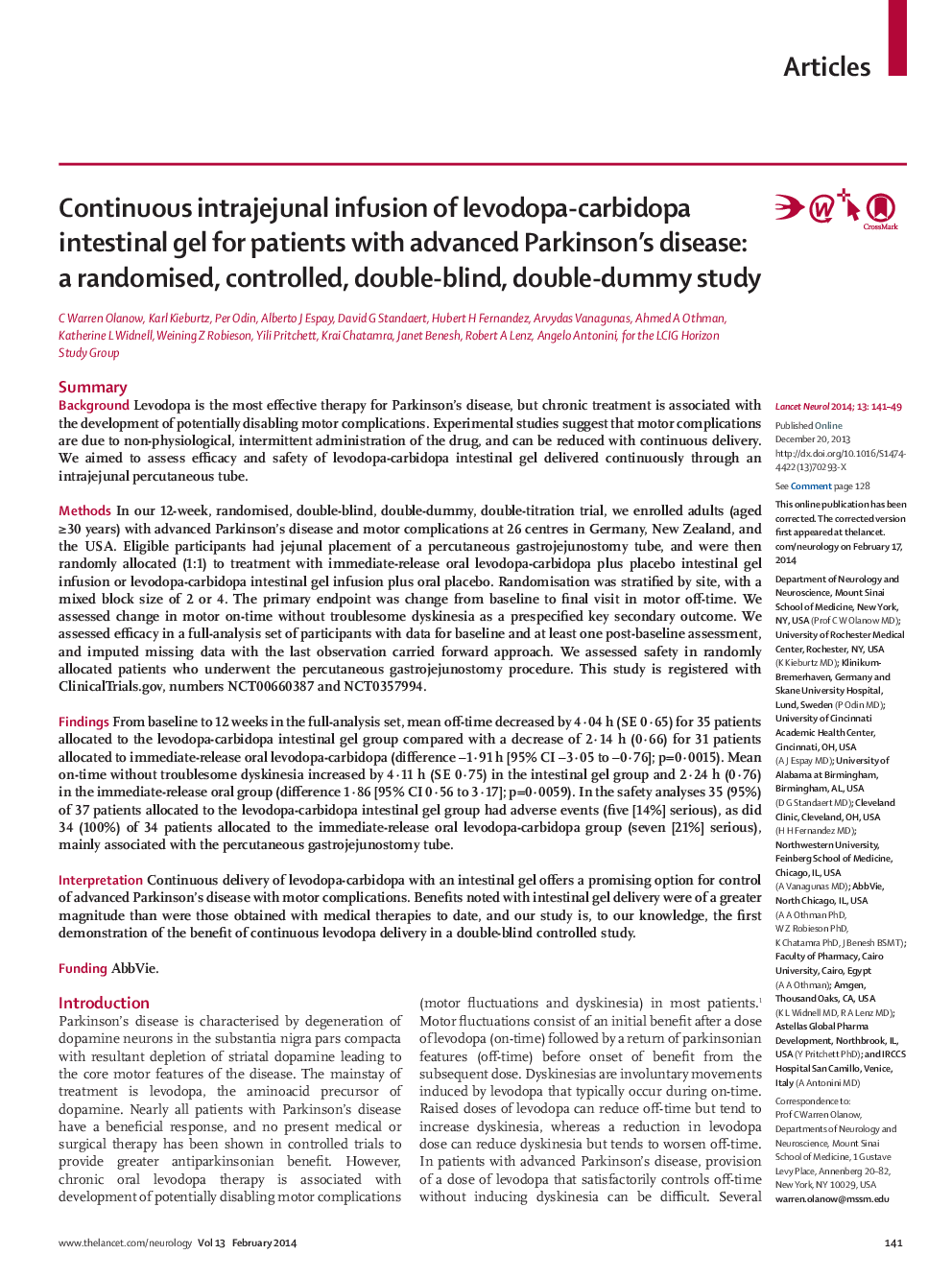| کد مقاله | کد نشریه | سال انتشار | مقاله انگلیسی | نسخه تمام متن |
|---|---|---|---|---|
| 3066644 | 1188091 | 2014 | 9 صفحه PDF | دانلود رایگان |
SummaryBackgroundLevodopa is the most effective therapy for Parkinson's disease, but chronic treatment is associated with the development of potentially disabling motor complications. Experimental studies suggest that motor complications are due to non-physiological, intermittent administration of the drug, and can be reduced with continuous delivery. We aimed to assess efficacy and safety of levodopa-carbidopa intestinal gel delivered continuously through an intrajejunal percutaneous tube.MethodsIn our 12-week, randomised, double-blind, double-dummy, double-titration trial, we enrolled adults (aged ≥30 years) with advanced Parkinson's disease and motor complications at 26 centres in Germany, New Zealand, and the USA. Eligible participants had jejunal placement of a percutaneous gastrojejunostomy tube, and were then randomly allocated (1:1) to treatment with immediate-release oral levodopa-carbidopa plus placebo intestinal gel infusion or levodopa-carbidopa intestinal gel infusion plus oral placebo. Randomisation was stratified by site, with a mixed block size of 2 or 4. The primary endpoint was change from baseline to final visit in motor off-time. We assessed change in motor on-time without troublesome dyskinesia as a prespecified key secondary outcome. We assessed efficacy in a full-analysis set of participants with data for baseline and at least one post-baseline assessment, and imputed missing data with the last observation carried forward approach. We assessed safety in randomly allocated patients who underwent the percutaneous gastrojejunostomy procedure. This study is registered with ClinicalTrials.gov, numbers NCT00660387 and NCT0357994.FindingsFrom baseline to 12 weeks in the full-analysis set, mean off-time decreased by 4·04 h (SE 0·65) for 35 patients allocated to the levodopa-carbidopa intestinal gel group compared with a decrease of 2·14 h (0·66) for 31 patients allocated to immediate-release oral levodopa-carbidopa (difference −1·91 h [95% CI −3·05 to −0·76]; p=0·0015). Mean on-time without troublesome dyskinesia increased by 4·11 h (SE 0·75) in the intestinal gel group and 2·24 h (0·76) in the immediate-release oral group (difference 1·86 [95% CI 0·56 to 3·17]; p=0·0059). In the safety analyses 35 (95%) of 37 patients allocated to the levodopa-carbidopa intestinal gel group had adverse events (five [14%] serious), as did 34 (100%) of 34 patients allocated to the immediate-release oral levodopa-carbidopa group (seven [21%] serious), mainly associated with the percutaneous gastrojejunostomy tube.InterpretationContinuous delivery of levodopa-carbidopa with an intestinal gel offers a promising option for control of advanced Parkinson's disease with motor complications. Benefits noted with intestinal gel delivery were of a greater magnitude than were those obtained with medical therapies to date, and our study is, to our knowledge, the first demonstration of the benefit of continuous levodopa delivery in a double-blind controlled study.FundingAbbVie.
Journal: - Volume 13, Issue 2, February 2014, Pages 141–149
